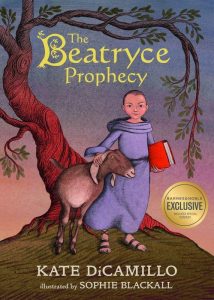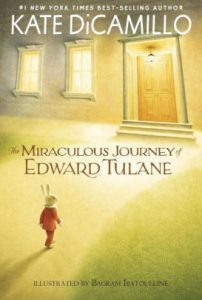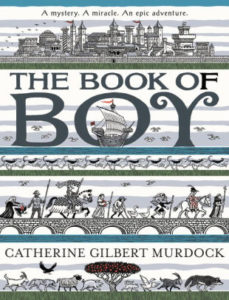It’s time for our annual Newbery Buzz Series: a series we run each January in which we discuss books with “Newbery Buzz.” That is, books we’ve heard lots of “buzz” about on various children’s literature websites through the past year.
No one knows which books have real “Newbery Buzz,” which books the actual Newbery committee is seriously considering, but we think it’s valuable to take a closer look at the books our broader American culture is discussing. This year is the 100th anniversary of the Newbery Medal, so whoever wins this year will have a unique place in the canon!
First up: The Beatryce Prophecy by Kate DiCamillo


Betsy: We’re Kate DiCamillo fans around here: her chapter book series set on Deckawoo Drive is delightful. Books like The Miraculous Journey of Edward Tulane move us to tears. The Tale of Despereaux is one of our favorite mice stories. But sometimes, her books make us wonder: what is DiCamillo doing? We’re not sure what to think of books like Flora & Ulysses, for instance.
DiCamillo’s latest book, The Beatryce Prophecy, falls into that latter camp for me. I’m just not sure what to think of it, especially when I think of her most recent middle grades books, like Louisiana’s Way Home.
Janie, did you go into the reading of The Beatryce Prophecy with any expectations about the storyline or the kind of book it was going to be?
Janie: I loved the cover and the overall style of the book—and the illustrations by Sophhie Blackall are another plus, we should add. I’m also a fan, from way back, of quasi-medieval adventures on the order of The Sword in the Stone and The Horse and His Boy. The reviews also suggested a spiritual dimension, and one thing I appreciate about DiCamillo is that sense of “something beyond” in all her fiction.
Plot v. Characters in The Beatryce Prophecy
I’m not sure I liked the style, though. She tells the story from multiple perspectives with immediate impressions that are a little hard to fit together at first. The characters are nicely developed, except for the villains, who are motivated by greed and power, and we don’t learn much more about them. The plot itself seems thin—Beatryce has a prophecy to fulfill, and it’s accomplished rather easily. It’s as though DiCamillo put all her energy into the characters, stirred them together and set them on a journey with a few pitfalls along the way. Once they reach their destination, the villains are quickly overthrown and peace reigns. And I’m thinking . . . so what?
Betsy: You know, I think you’re on to something. I hadn’t thought about the plot being thin, but I agree, and I think that helps explain why I was underwhelmed. Some of my favorite DiCamillo books (like the Deckawoo Drive books) don’t have elaborate plots, but there is a plot and there is enough interest and suspense along the way that the reader enjoys the journey. But this book felt almost too easy in that respect. I kept waiting for some big reveal or something truly extraordinary. I do think Beatryce herself is a rather extraordinary character, and I love her goat sidekick. Who is your favorite character, and how do you think these characters stand up to other memorable DiCamillo characters?
Janie: Beatryce is a great character, as is spunky, clever Jack. But I love Brother Edik, a kind of “holy fool” whose foolishness consists of being completely open to grace and beauty. I’m reminded of Jesus’s observation about Nathanael: a true son of Israel, in whom there is no guile. Though literally the butt of Answelica’s (the goat’s) jokes, mocked by his father, and condescended to by the abbot, he perseveres in faith and sees his reward.


Most of these characters have a mythic quality about them: scheming sorcerer, treacherous usurper, noble king, scrappy sidekick. As such, they don’t seem as real as the girls of DiCamillo’s Raymie Nightingale series, though all those girls face extreme obstacles (like disappearing grandmothers and indifferent parents). Oddly, the DiCamillo character who most resonates with me is Edward Tulane, who isn’t human at all. I think that’s because we see his faults, his self-centeredness and pride, and witness how he overcomes them through the love of others. In The Beatryce Prophecy, we don’t see major characters change—what they are at the beginning is pretty much what they are at the end. That might be why I felt some emotional distance from it. Am I missing something?
Betsy: Oh, Edward Tulane is wonderful. I might need to reread that this year with my teens.
I think you’re right: unlike so many of DiCamillo’s characters, the characters in The Beatryce Prophecy accomplish their mission, but the mission doesn’t really change them or cause them to mature or even to really analyze themselves. There’s no new significant self awareness. That’s such a strength in her other works; the characters’ new self awareness prompts readers to do the same. Beatryce and her goat (and Brother Edick and the rest) are certainly memorable, though, even if they end the book in the same way they began. I wonder if the uniqueness of this book is enough to grab the attention of the Newbery committee.
Does The Beatryce Prophecy Have What It Takes?
Let’s play Newbery committee and see how this book lines up with other Medieval setting books: how do you think this book compares with something like The Book of Boy? In that book, a similar journey or quest is underway, and the main character is similarly mythical. How would you compare the two?


Janie: Ah—interesting comparison. There are a lot of similarities, but The Book of Boy takes place in a designated place and time, and the theme is more spiritual and Christian-ish without being Christian. The reveal (can’t say what it is!) connects heaven with earth. Beatryce is more of a heaven on earth scenario, with a rightful king restored and all wrongs righted. It doesn’t have quite the resonance of Boy, at least for me. That said, I think Beatryce has a good shot at Newbery honors, even though DiCamillo has won the gold twice already. Do you agree?
Betsy: I do agree. This would be DiCamillo’s third time on the Newbery line-up, if I’m remembering correctly. She’s certainly a talented author, and I think readers are eager to read stories like The Beatryce Prophecy, stories in which unlikely heroes are fulfilling their mission. We see a lot of books like that in a given year, but lately, so many books for middle grades readers feel very agenda driven. The Beatryce Prophecy is refreshingly free of current angst and agenda regarding race, gender, and politics. (Although, there is an interesting undercurrent of gender issues in this book, it’s not as heavy-handed and political as so many other contemporary books.)
Readers, what do you think? Have you read The Beatryce Prophecy? Are you hoping it wins a Newbery medal later this month?
Stay tuned for the rest of our series. We’ll be looking at several more “Newbery Buzz” books this month.
Stay Up to Date!
Get the information you need to make wise choices about books for your children and teens.
Our weekly newsletter includes our latest reviews, related links from around the web, a featured book list, book trivia, and more. We never sell your information. You may unsubscribe at any time.
Support our writers and help keep Redeemed Reader ad-free by joining the Redeemed Reader Fellowship.
Stay Up to Date!
Get the information you need to make wise choices about books for your children and teens.
Our weekly newsletter includes our latest reviews, related links from around the web, a featured book list, book trivia, and more. We never sell your information. You may unsubscribe at any time.
FREE Bible Guide!
Get a guide to the Best Bibles for Children and Teens. Perfect for an Easter gift.
We'd love to hear from you!
Our comments are now limited to our members (both Silver and Golden Key). Members, you just need to log in with your normal log-in credentials!
Not a member yet? You can join the Silver Key ($2.99/month) for a free 2-week trial. Cancel at any time. Find out more about membership here.
2 Comments
Leave a Comment
You must be logged in to post a comment.


I felt like was some tonal dissonance in the book – there was some pretty intense accounts of death and destruction alongside the innocence and whimsy of the book. The plot felt too short to deal with those elements seriously. I liked the characters and I do like DiCamillo’s writing a lot, but I agree that the plot felt underdeveloped in some respects.
Answelica was wonderful and made me laugh out loud. HOwever, I agree with Jo. I love DICamilo’s writing, (The Tale of Despereaux is one of my favorite books), but I found the climax of this one to be rather rushed. THe villain was strongly developed but didn’t put up any sort of fight. THis seemed to go against his character. I lloved the premise of the book, and Beatryce and Jack DOrey were particularly strong characters, but I just don’t know how the book would stand against other titles this year.
I hope that 2022 will provide us with some well-written and edifying fantasy books. DICamillo is definitely a wonderful writer and does a terrific job. I think THe Beatryce Prophecy would make a good honor title.